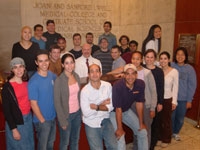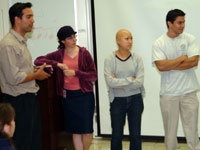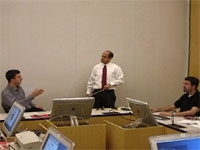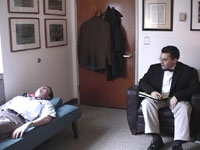
Members of Weill Cornell's Class of 2006 on campus after a screening of "The PBL Experience."
Most would agree that long hours of intense study go hand in hand with the medical student's schedule. But members of Weill Cornell's Class of 2006 proved that learning can also be comical—and still profoundly meaningful—when they wrote and produced an entertainingly insightful film about problem-based learning, better known as "PBL."
Adopted in recent years by several of the nation's top medical schools, PBL was introduced to the Medical College in the mid-1990s by Dr. Daniel Alonso, former senior associate dean for academic affairs. Dr. Alonso, now dean of Weill Cornell Medical College-Qatar, had directed a major curricular reform that included the integration of basic and clinical sciences, office-based preceptorships, and primary-care and doctoring courses as well as problem-based learning.

From left: Medical students Alex Gomez, Tzivia Moreen, Carolyn Goh and Rafael Vazquez respond to audience's questions about the film.
PBL focuses on active learning in the classroom, usually employing small groups of about 10 students and one facilitator. Over the course of the week, a medical case unfolds and students are required to identify the pertinent biological and clinical issues. Then, after conducting quality research, the medical students reconvene to apply and evaluate the information learned within the context of that week's case.
But the film's premise is that the idea of PBL doesn't always coincide with its reality.

From left: Medical students David Padua, Daniel Jamieson, Carolyn Goh and Stephanie Kemper in the "Endless Presentation"
"The film incorporates a lot of inside jokes that make sense after you've been here for a couple of weeks," says Jennifer Hellawell (Class of 2007).
"The PBL Experience" is an 18-minute production that began filming in December 2002. After months of writing, editing and interviewing, the students held a premiere screening on September 15, 2003, to an audience of about 100 students, faculty and staff.
Besides the 25 or so students who worked on the film project, Alexander Gomez, president of the class of 2006, and David Lieberman, '06, played pivotal roles in the production of "The PBL Experience." According to Lieberman, "The film had to be flexible enough to adapt to the demands of our schedules. The entire process was at times frustrating, but proved rewarding in the end. It was really important to us to create a tangible product that could be put to good use, something that would stimulate discussion. Fortunately for us, Dr. Marzuk was excellent in letting us go as far as we wanted to creatively."
The film focuses primarily on student interaction in PBL sessions, but also includes a component on faculty development. Several Weill Cornell student actors are featured, as well as "faculty clips." According to Dr. Peter Marzuk, associate dean of curricular affairs, "The project was sponsored by my office as an educational venture and partnership with the students, to help incoming students learn about the philosophy of PBL. It can also be used to educate faculty on how to be better PBL facilitators."
As "The PBL Experience" begins, viewers are brought into the faux office of Dr. Marzuk—known in the film as Dr. Musak—played by medical student Jonathan Nowak. Throughout the film, Nowak is seen drawing caricatures and even browsing the Internet when he should be listening to his distraught patients—behavior typical of someone who failed to grasp the lessons of PBL.
According to Dr. Marzuk, "The film has both an educational and entertainment value and rates at least a PG-13." But was Dr. Marzuk offended by the paradigm that presented jokes at his expense?

From left: Medical students Marc Waase, David Lieberman and David Padua in the "Competitive Facilitator" scene.
"Not at all," he says. "It was good to see the students become involved in this important issue and to do it in a funny, yet serious way. This film helped students to think more about how to effectively deal with different personalities and how to work through tense situations," he added.
In the film, Dr. Musak's first patient is a deeply troubled PBL facilitator, played by medical student Daniel Jamieson. Jamieson comes to Dr. Musak after becoming increasingly frustrated with students' lack of respect in PBL sessions. Jamieson offers as one example the "long-handout student"—played by Carolyn Goh, '06—who often rushes to class with a piling stack of Xeroxes she's made for her peers. The lesson here is loud and clear: monopolizing PBL sessions with overwhelming handouts is not only daunting—it's unacceptable. Again, the idea of PBL is not to regurgitate textbook facts; the concept encourages the use of critical and analytical skills to find answers to hypothetical, clinical scenarios.
In real life, Goh says she is nothing like the obsessive character she plays in the film, but admits that there are many other points that were not addressed in "The PBL Experience," because of time restrictions. She offers as one gripe the tendency of some students to change personalities as they go from one PBL group to another. "A student who is really intimidating in one group may switch and become the passive person in another group," she said, adding, "things can get really frustrating."
Gomez agrees: "When students start PBL they do not know what exactly is normal behavior or what goes on in other PBL groups. The same holds true with facilitators. Since pamphlets had proven ineffective in the past, a movie was the perfect medium for catching the attention of new students and facilitators in a way that still provides important information on the dynamics of PBL."
Other scenarios presented in the film center on domineering students and questionable facilitators who help foster unhealthy, competitive environments.
Rafael Vazquez, '06, president of the Weill Cornell Medical Student Executive Council, hilariously exemplifies the domineering student. In the film he is shown pouncing in front of a classroom of his peers to solve a PBL problem. But instead of answering the question posed, Vazquez rips off his T-shirt—Hulk-like—to show off a burly physique. In the end, he shuns a less assertive student who is too intimidated by Vazquez's odd behavior to participate in the PBL session, ultimately depriving other students from gaining pertinent information.
While "The PBL Experience" is sprinkled with lighthearted spoofs, the concerns are real and often problematic for students.
"PBL is such a new way of learning that many students and faculty don't understand their roles," says Joseph Habboushe, '06, Weill Cornell student overseer.

From left: Medical students Daniel Jamieson and Jonathan Nowak in the "On the Couch" scene.
The good news is that many students have gone from PBL leeriness to optimism, including Gomez: "I had my doubts about PBL at the beginning, but now I am a true believer." He continues, "The most amazing thing about PBL is that it not only helps you learn how to interact and work with your peers well—which is crucial in medicine—but it does a great job teaching students how to access information. The reality is, the good doctors of the future are those that are well-trained at quickly and thoroughly accessing quality information, not the ones who listened to a million lectures in medical school. It is amazing how a group of students can sit around and in a week not only figure out a rare genetic disease, but also learn and teach each other about the latest methods to diagnose and treat it."
"The PBL Experience" is currently in the process of obtaining a copyright. "Hopefully the film will continue to be used as an educational tool or at least a template for future student and faculty development in the pre-clinical curriculum," says Lieberman.
Photos by Amelia Panico.

